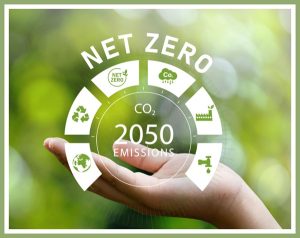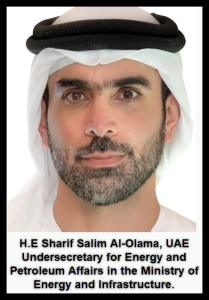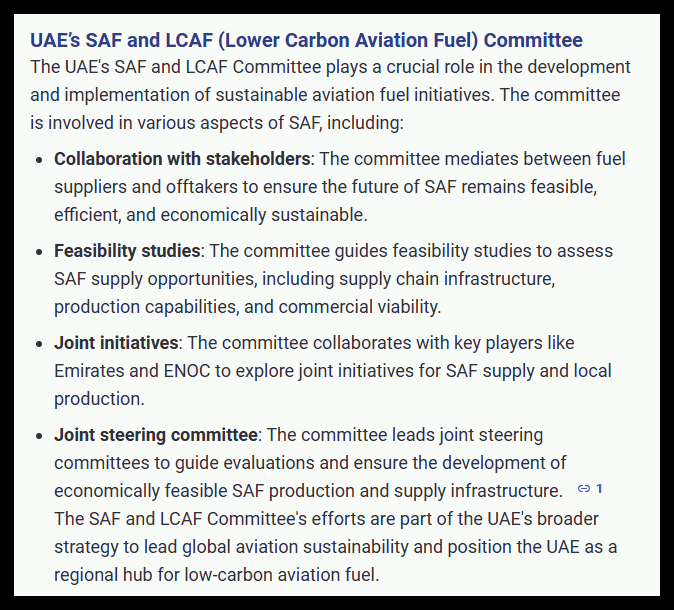UAE may mandate more SAF—REALLY???
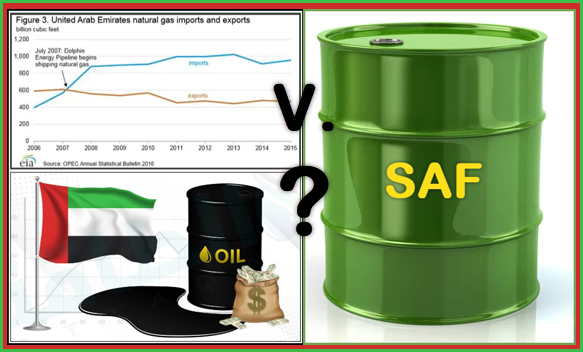
His Excellency Eng Sharif Al Olama, Undersecretary for Energy and Petroleum Affairs at the Ministry of Energy and Infrastructure, announced that the United Arab Emirates is seriously considering mandating a 2% Sustainable Aviation Fuel standard[1]. (see below article). An immediate reaction might be why would the UAE impose the use of a fuel that might harm its primary economy—the export of oil?
The country produces 3.200,000 barrels a day and the US Energy Information Administration estimates that the oil and gas industry is 30% of UAE’s GDP. USEIA forecast that the production will reach 5 million BBL/D by 2027.
The UAE’s oil production is not only a key economic driver but also a strategic asset for the country’s energy security and its foreign relations. The country’s commitment to increasing its production capacity and diversifying its energy sources demonstrates its strategic vision and resilience.
However, the UAE appears genuinely committed to greening aviation through Sustainable Aviation Fuel, and rather than conflicting with its petroleum exports, SAF development is being positioned as a STRATEGIC COMPLEMENT TO ITS ENERGY LEADERSHIP. Here is the underpinning rationale (sources[2]):
SAF Production Goal: The UAE aims to produce 700 million liters of SAF annually by 2030, positioning itself as a regional hub for low-carbon aviation fuel.
- Policy Integration: SAF is embedded in the UAE’s Net Zero by 2050 Strategic Initiative, aligning aviation decarbonization with national climate goals.
- Infrastructure & Partnerships: Emirates and ENOC (Dubai’s state-owned energy company) signed MoUs to explore SAF supply chains, local production, and feasibility studies.
- International Collaboration: The UAE is working with Chinook Hydrogen on a SAF plant in Hong Kong, signaling global ambitions.
- Drop-in Compatibility: SAF blends with conventional jet fuel, meaning petroleum remains part of the mix—especially in early adoption phases.
- Export Opportunity: The UAE sees SAF not just as a domestic solution but as a new export commodity, reinforcing its role as a global energy supplier.
- Petroleum Synergy: SAF production can utilize byproducts and technologies from petrochemical processes, creating synergies rather than competition.
- In short, SAF is being framed not as a replacement for petroleum, but as A STRATEGIC EVOLUTION—one that sustains the UAE’s energy dominance while aligning with global climate imperatives.
A visceral disbelief appears to be wrong. The UAE’s published strategic vision is consistent with the Paris Agreement through the United Nations Framework Convention on Climate Change, the ICAO Corsia and the US’s own energy policy
UAE Aims for Mandatory Sustainable Aviation Fuel to Boost Green Aviation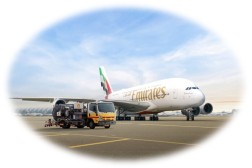
The UNITED ARAB EMIRATES is accelerating efforts to implement sustainable aviation fuel, reflecting its ambition to lead global aviation sustainability. Authorities are considering moving from the current voluntary 1% blend of SAF (sustainable aviation fuel) to a mandatory requirement. This key step demonstrates the UAE’s commitment to reducing carbon emissions and shaping the future of green aviation.
Sharif Al Olama, undersecretary for energy and petroleum affairs at the UAE Ministry of Energy and Infrastructure, highlighted that a “comprehensive assessment” of SAF’s economic impact will guide the country’s next regulatory steps. Over the coming year, the government will evaluate both investment opportunities and operational feasibility before finalizing a mandate.
Al Olama emphasized that the UAE HAS THE POTENTIAL TO SET A GLOBAL EXAMPLE IN SUSTAINABLE AVIATION. “We want to hit the ground running with SAF,” he said. He also announced meetings with Abu Dhabi Airport, Dubai Airport, Etihad Airways, and Emirates to determine when the country can advance to the next phase. Reactions from these key stakeholders have been positive, he added.
The UAE’s SAF and LCAF (Lower Carbon Aviation Fuel) Committee actively mediates between fuel suppliers and offtakers. This collaboration ensures that the future of SAF in the UAE remains feasible, efficient, and economically sustainable.
Maryam Ali AlBalooshi, environment manager at the UAE General Civil Aviation Authority, noted that the UAE aims to deliver measurable results by 2028. She said the country is building its SAF model differently from other nations. While policies and roadmaps are in place, other supporting elements, such as technology adoption and operational frameworks, still need development.
The UAE’s aviation infrastructure provides an ideal foundation for SAF expansion. Airports in Abu Dhabi and Dubai offer sufficient scale to implement innovative solutions, such as converting airport waste into SAF. Officials also pointed to the country’s ability to attract investment, provide financing, and maintain agile governance as crucial advantages.
Overall, THE UAE’S PUSH TOWARD MANDATORY SAF DEMONSTRATES A STRONG COMMITMENT TO GREEN AVIATION. The initiative positions the nation as a leader in sustainable energy for aviation. SAF adoption in the UAE will shape the future of eco-friendly air travel and inspire global aviation sustainability.
[1] The statement is not specific that this SAF requirement would apply to UAE’s carriers, all carriers operating at the monarchy’s 20 airports, or a proposed global standard?
[2] UAE Prepares To Introduce SAF Mandate For Airlines | Aviation Week Network; UAE Advances Toward Binding SAF Mandate for Airlines by 2025; General Policy for Sustainable Aviation Fuel | The Official Platform of the UAE Government; Emirates and ENOC Sign MoU to Consider SAF Supply in Dubai | Aviation Pros; Emirates ENOC sign MoU to develop SAF supply initiatives;; Emirates, ENOC partner to advance SAF supply in Dubai
